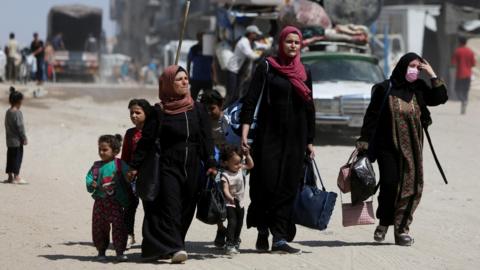Israel launched a military campaign in Gaza in response to the unprecedented cross-border attack almost 20 months ago, in which about 1,200 people were killed and 251 others were taken hostage.
Another four people, two of them dead, were already being held captive in Gaza before the conflict.
So far, 199 hostages have been returned, 148 of them alive, mostly through two temporary ceasefire deals with Hamas.
At least 54,677 people have been killed in Gaza during the war, according to the territory's Hamas-run health ministry.
Israel imposed a total blockade on Gaza on 2 March and resumed its military offensive against Hamas two weeks later, collapsing a two-month truce during which 33 Israeli hostages and five Thai hostages were freed. Israel said it wanted to put pressure on Hamas to release the remaining hostages.
On 19 May, the Israeli military launched an expanded offensive that Netanyahu said would see troops "take control of all areas" of Gaza. Israel also partially eased its blockade, allowing some food into the territory amid warnings from experts of a looming famine.
More than 4,400 people have reportedly been killed in Gaza over the past three months, while 640,000 others have been displaced again by Israeli ground operations and evacuation orders.
Hopes of a new ceasefire deal faded last week, with Hamas and Israel remaining at odds over the conditions of the latest US proposal.
Hamas said it was prepared to release 10 living hostages and the bodies of 18 dead ones, which was the number specified in US envoy Steve Witkoff's proposal, in exchange for a 60-day truce and the release of Palestinian prisoners.
But the group also repeated its demands for guarantees that the truce would lead to a permanent ceasefire, as well as a complete Israeli withdrawal from Gaza, and the resumption of unrestricted aid deliveries.
Israel called Hamas's statement a refusal of the proposal, and Witkoff said it was totally unacceptable. But a Hamas official insisted it had acted positively and responsibly.

